
"The Days of Perky Pat" is a science fiction short story by American writer Philip K. Dick, first published in 1963 in Amazing magazine.

"The Days of Perky Pat" is a science fiction short story by American writer Philip K. Dick, first published in 1963 in Amazing magazine.
In this short story, survivors of a global thermonuclear war live in isolated enclaves in California, surviving off what they can scrounge from the wastes and supplies delivered from Mars. The older generation spend their leisure time playing with the eponymous doll in an escapist role-playing game that recalls life before the apocalypse — a way of life that is being quickly forgotten. At the story's climax, a couple from one isolated outpost of humanity plays a game against the dwellers of another outpost (who play the game with a doll similar to Perky Pat dubbed "Connie Companion") in deadly earnest. The survivors' shared enthusiasm for the Perky Pat doll and the creation of her accessories from vital supplies is a sort of mass delusion that prevents meaningful re-building of the shattered society. In stark contrast, the children of the survivors show absolutely no interest in the delusion and have begun adapting to their new life.
Elements of the story were later incorporated into Dick's novel The Three Stigmata of Palmer Eldritch , written in 1964 and published in 1965, in which a Perky Pat simulation game is induced by drugs and miniature models. [1]
David Cronenberg's 1999 film eXistenZ , which involves a virtual reality game that blurs reality and fantasy, visually refers to the Dick short story when its two stars, Jude Law and Jennifer Jason Leigh, consume fast food from containers marked "Perky Pat's". [1]

Cyberpunk is a subgenre of science fiction in a dystopian futuristic setting said to focus on a combination of "low-life and high tech". It features futuristic technological and scientific achievements, such as artificial intelligence and cyberware, juxtaposed with societal collapse, dystopia or decay. Much of cyberpunk is rooted in the New Wave science fiction movement of the 1960s and 1970s, when writers like Philip K. Dick, Michael Moorcock, Roger Zelazny, John Brunner, J. G. Ballard, Philip José Farmer and Harlan Ellison examined the impact of technology, drug culture, and the sexual revolution while avoiding the utopian tendencies of earlier science fiction.

Philip Kindred Dick, often referred to by his initials PKD, was an American science fiction writer and novelist. He wrote 44 novels and about 121 short stories, most of which appeared in science fiction magazines during his lifetime. His fiction explored varied philosophical and social questions such as the nature of reality, perception, human nature, and identity, and commonly featured characters struggling against elements such as alternate realities, illusory environments, monopolistic corporations, drug abuse, authoritarian governments, and altered states of consciousness. He is considered one of the most important figures in 20th-century science fiction.
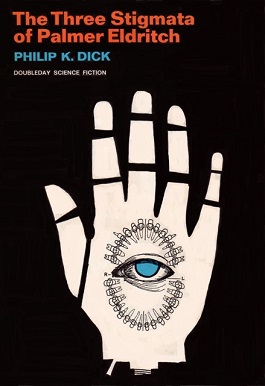
The Three Stigmata of Palmer Eldritch is a 1964 science fiction novel by American writer Philip K. Dick. It was nominated for the Nebula Award for Best Novel in 1965. Like many of Dick's novels, it utilizes an array of science fiction concepts and explores the ambiguous slippage between reality and unreality. It is one of Dick's first works to explore religious themes.

Who Goes There? is a 1938 science fiction horror novella by American author John W. Campbell, written under the pen name Don A. Stuart. Its story follows a group of people trapped in a scientific outpost in Antarctica infested by shapeshifting monsters able to absorb and perfectly imitate any living being, including humans. Who Goes There? was first published in the August 1938 issue of Astounding Science Fiction magazine and was also printed as The Thing from Another World, as well as included in the collection by the same title. Its extended, novel version, found in an early manuscript titled Frozen Hell, was finally published in 2019.

"Shell Game" is a science fiction short story by American writer Philip K. Dick. It was submitted to the Scott Meredith Literary Agency and received by SMLA on December 12, 1953. It was published in Galaxy Science Fiction in September 1954.
"Breakfast at Twilight" is a science fiction short story by American writer Philip K. Dick. It was received by the Scott Meredith Literary Agency on January 17, 1953 and first published in Amazing Stories, July 1954. It appears in the second volume reprint of Philip K. Dick's short stories Second Variety.
"Roog" is a science fiction short story by American writer Philip K. Dick. It was his first sold work, although not his first published story.
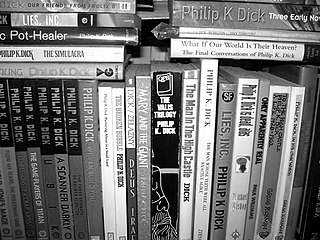
The bibliography of Philip K. Dick includes 44 novels, 121 short stories, and 14 short story collections published by American science fiction author Philip K. Dick during his lifetime.

"Psi-man Heal My Child!" is a science fiction short story by American writer Philip K. Dick, originally published in the November 1955 issue of the magazine Imaginative Tales. It also has the alternative titles of "Psi-Man" and "Outside Consultant", and appeared, among the others, in Dick's short story collections The Book of Philip K. Dick and Second Variety.
"The Mold of Yancy" is a political science fiction short story by American writer Philip K. Dick, first published in 1955. It is published in volume four of The Collected Stories of Philip K. Dick, The Days of Perky Pat.

The Best of Philip K. Dick is a collection of science fiction stories by American writer Philip K. Dick. It was first published by Del Rey Books in 1977 as a volume in its Classic Library of Science Fiction. Many of the stories had originally appeared in the magazines Planet Stories, Fantasy and Science Fiction, Space Science Fiction, Imagination, Astounding Stories, Galaxy Science Fiction, Amazing Stories, Science Fiction Stories and Startling Stories, as well as the anthologies Dangerous Visions and Star Science Fiction Stories No.3.

The Collected Stories of Philip K. Dick is a collection of 118 science fiction stories by American writer Philip K. Dick. It was first published by Underwood-Miller in 1987 as a five volume set. See Philip K. Dick bibliography for information about the mass market reprints.
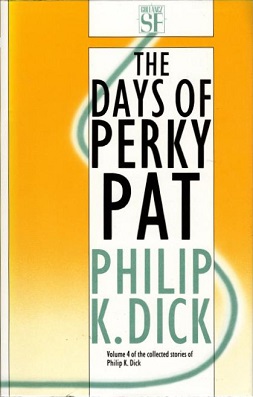
The Days of Perky Pat is a collection of science fiction stories by American writer Philip K. Dick. It was first published by Gollancz in 1990 and reprints Volume IV of The Collected Stories of Philip K. Dick. It had not previously been published as a stand-alone volume. The stories had originally appeared in the magazines Galaxy Science Fiction, Science Fiction Stories, If, Fantastic Universe, Fantasy and Science Fiction, Fantastic, Worlds of Tomorrow, Escapade and Amazing Stories.

The Minority Report is a re-titled collection of science fiction stories by Philip K. Dick. It was published by Gollancz and Citadel Twilight in 1991, being a reprint of Volume IV, "The Days of Perky Pat" of The Collected Stories of Philip K. Dick (1987). The collection The Days of Perky Pat was published in Britain in hardback by Gollancz in 1990 and in paperback by Grafton in 1991. The stories had originally appeared in the magazines Galaxy Science Fiction, Science Fiction Stories, If, Fantastic Universe, Fantasy and Science Fiction, Fantastic, Worlds of Tomorrow, Escapade and Amazing Stories.
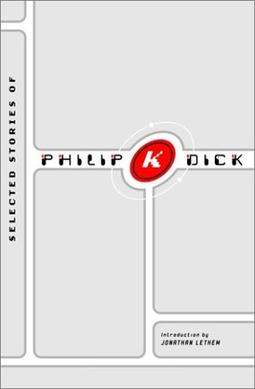
Selected Stories of Philip K. Dick is a collection of science fiction stories by American writer Philip K. Dick. It was first published by Random House in 2002. Many of the stories had originally appeared in the magazines Planet Stories, Fantasy and Science Fiction, Imagination, Space Science Fiction, Astounding, Beyond Fantasy Fiction, Orbit, Galaxy Science Fiction, Fantastic Universe, Amazing Stories, Rolling Stone College Papers, Omni and Playboy.

Paycheck is a collection of science fiction stories by American writer Philip K. Dick. Although the collection appears with a 2003 copyright, it was first published by Gollancz in February, 2004. Many of the stories had originally appeared in the magazines Imagination, Startling Stories, Amazing Stories, Fantasy and Science Fiction and Galaxy Science Fiction.

Vintage PKD is a collection of science fiction stories, novel excerpts and non-fiction by Philip K. Dick. It was first published by Vintage Books in 2006.
Portrayals of survivalism, and survivalist themes and elements such as survival retreats have been fictionalised in print, film, and electronic media. This genre was especially influenced by the advent of nuclear weapons, and the potential for societal collapse in light of a Cold War nuclear conflagration.
"Recall Mechanism" is a science fiction short story by American author Philip K. Dick, first published in 1959 and later in The Collected Stories of Philip K. Dick, Vol. IV, The Days of Perky Pat (1987).
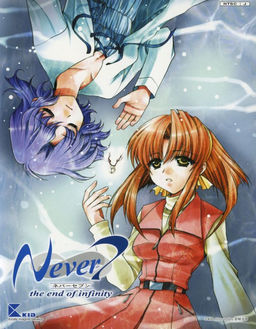
Never 7: The End of Infinity is a visual novel video game developed by KID. It was originally published by KID on March 23, 2000, for the PlayStation as Infinity, and has since been released on multiple platforms. It is the first entry in the Infinity series, and is followed by Ever 17, Remember 11, the spin-off 12Riven, and the reboot Code_18.